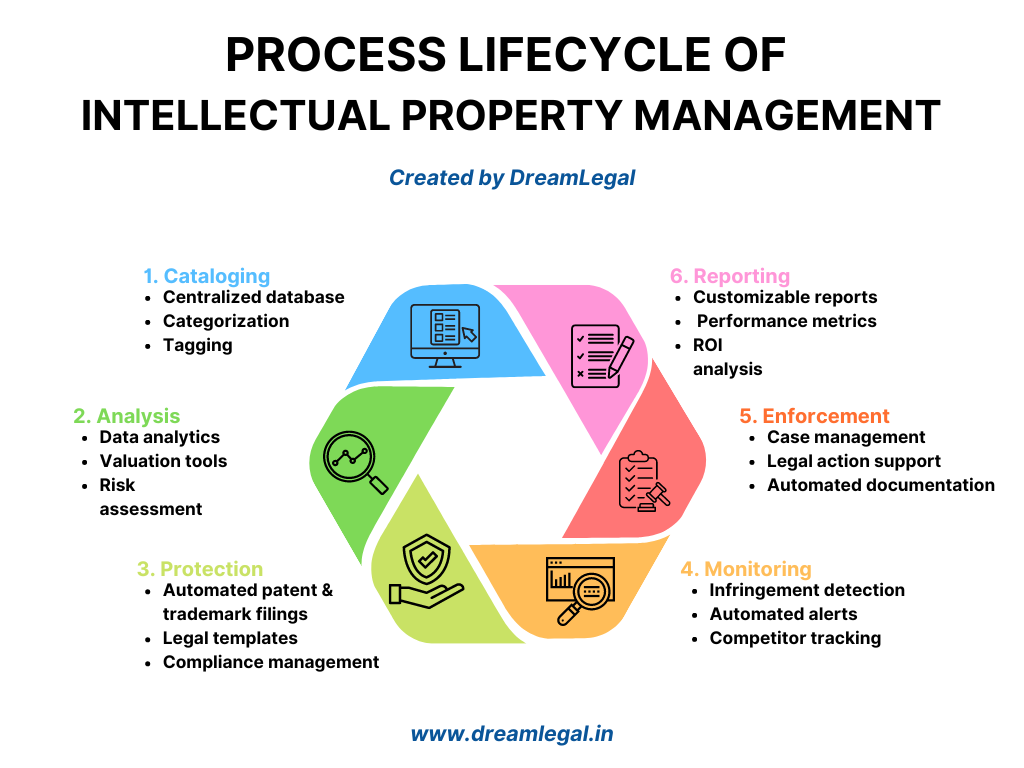Introduction
In the fast-paced world of legal practice, managing intellectual property (IP) efficiently is crucial. Intellectual Property Management (IPM) tools provide the necessary infrastructure to manage, protect, and enforce IP assets. This article provides an overview of the IP lifecycle, explores essential functionalities of IP management tools, and offers tailored recommendations for different types of legal professionals.
Understanding the Intellectual Property Lifecycle
The IP lifecycle is composed of several stages, each playing a critical role in the overall management of intellectual property. Effective IP management tools must address each of these stages to ensure comprehensive protection and optimization of IP assets.

The IP Lifecycle Stages
Cataloging
- Key Features: Centralized database, categorization, and tagging.
- For Law Firms: Cataloging helps maintain organized portfolios for various clients, ensuring quick access to relevant IP assets.
- For Individual Practitioners: Easy cataloging supports solo lawyers in managing diverse IP portfolios without overwhelming complexity.
- For Enterprises: Comprehensive categorization is crucial for large organizations with extensive IP assets across departments.
- For In-House Legal Teams: Efficient cataloging integrates IP management with broader business operations.
- For Startups and Small Firms: Simple cataloging systems help emerging businesses maintain organized records as they grow.
- For Government Departments: Robust cataloging ensures that public sector IP assets are accurately tracked and managed.
- For Judiciary: Secure and systematic cataloging is essential for tracking IP-related cases and legal documents.
Analysis
- Key Features: Data analytics, valuation tools, risk assessment.
- For Law Firms: Analytical tools help in advising clients on the value and strategic importance of their IP assets.
- For Individual Practitioners: Solo lawyers benefit from simple yet powerful analytics to assess the viability of pursuing IP protection.
- For Enterprises: Advanced analytics are critical for large corporations to make informed decisions about IP investments.
- For In-House Legal Teams: Analysis tools assist in aligning IP strategy with overall business goals.
- For Startups and Small Firms: Basic analysis tools provide insights into the potential value of newly developed IP.
- For Government Departments: Analysis ensures that public IP is leveraged for maximum societal benefit.
- For Judiciary: Analytical features support judges and legal clerks in understanding the complexities of IP disputes.
Protection
- Key Features: Automated patent and trademark filings, legal templates, compliance management.
- For Law Firms: Tools that streamline filings and compliance are vital for managing multiple clients’ IP rights.
- For Individual Practitioners: Simple filing systems and templates aid solo lawyers in efficiently securing IP rights for their clients.
- For Enterprises: Automated protection features ensure timely and accurate filings across various jurisdictions.
- For In-House Legal Teams: Compliance management tools help maintain the organization’s adherence to IP laws and regulations.
- For Startups and Small Firms: Automated filing reduces the burden on small teams, allowing them to focus on innovation.
- For Government Departments: Ensures public sector IP is protected in line with government regulations.
- For Judiciary: Supports legal professionals in evaluating the protection measures in IP cases.
Monitoring
- Key Features: Infringement detection, automated alerts, competitor tracking.
- For Law Firms: Ongoing monitoring helps firms identify potential IP infringements, enabling proactive enforcement.
- For Individual Practitioners: Monitoring tools alert solo practitioners to potential infringements, allowing timely legal action.
- For Enterprises: Monitoring ensures that valuable IP is protected from unauthorized use, safeguarding business interests.
- For In-House Legal Teams: Competitor tracking and infringement alerts support strategic decision-making and risk management.
- For Startups and Small Firms: Monitoring tools provide peace of mind, ensuring that small businesses’ IP is not exploited by larger competitors.
- For Government Departments: Helps in overseeing IP assets that are in the public interest, preventing misuse.
- For Judiciary: Provides valuable data for courts to consider in IP infringement cases.
Enforcement
- Key Features: Case management, legal action support, automated documentation.
- For Law Firms: Enforcement tools are essential for managing litigation and other legal actions related to IP.
- For Individual Practitioners: Simple enforcement features help solo lawyers initiate and manage IP disputes effectively.
- For Enterprises: Legal action support features ensure that enforcement actions are coordinated across various departments and jurisdictions.
- For In-House Legal Teams: Tools that facilitate legal action help protect the company’s IP from infringement.
- For Startups and Small Firms: Enforcement tools allow small firms to take action against IP theft without significant resources.
- For Government Departments: Supports enforcement of public IP, ensuring compliance with government standards.
- For Judiciary: Case management features assist in handling IP enforcement cases efficiently.
Reporting
- Key Features: Customizable reports, performance metrics, ROI analysis.
- For Law Firms: Detailed reporting helps firms demonstrate the value of their services to clients and optimize their IP strategies.
- For Individual Practitioners: Simple reporting tools allow solo lawyers to track and present IP performance to clients.
- For Enterprises: Reports that analyze IP performance and ROI are crucial for justifying IP investments to stakeholders.
- For In-House Legal Teams: Reporting tools help align IP management with the company’s broader business objectives.
- For Startups and Small Firms: Basic reporting provides insights into the performance and value of IP assets, aiding strategic decisions.
- For Government Departments: Reporting ensures transparency and accountability in the management of public IP assets.
- For Judiciary: Enables the tracking of case outcomes and IP-related legal trends.

Evaluating Based on Practice Needs
The selection of an IP management tool should be guided by the specific needs of your legal practice. Here’s how different types of legal professionals can approach this evaluation:
Law Firms
- Focus: Comprehensive lifecycle management and collaboration features.
- Why: Law firms manage diverse IP portfolios, often requiring collaboration across teams. Tools that support full lifecycle management and offer advanced search capabilities are essential.
- Key Features: Workflow automation, centralized repository, advanced search and categorization.
In-House Legal Teams
- Focus: Integration with enterprise systems and contract management.
- Why: In-house teams need tools that integrate with existing enterprise systems to streamline IP management within broader organizational processes.
- Key Features: System integration, lifecycle management, renewal tracking.
Startups and Small Firms
- Focus: Cost-effective, scalable, and easy-to-use tools.
- Why: Smaller firms and startups require affordable solutions that grow with their business, offering essential features without overwhelming complexity.
- Key Features: Simple interface, customizable workflows, scalable storage options.
Core Functions of IP Management Tools
Selecting the right IP management tool involves understanding how different functionalities align with your practice’s needs. Here’s a breakdown of which functions benefit specific types of users:
Ideation and Creation
- Idea intake and management: Organizes and tracks new ideas from inception.
- Innovation workflow management: Streamlines processes to manage the development and progression of ideas.
Beneficial For: Startups, Small Firms, Individual Practitioners, Enterprises.
Why: These tools support the intake and management of new ideas, crucial for innovation-driven practices. Startups and small firms benefit from streamlined workflows that allow them to manage innovation with limited resources.
Lifecycle Management
- Workflow management system (IP lifecycle): Automates and monitors the entire lifecycle of IP assets.
- Renewal management: Tracks and manages renewal deadlines to avoid lapses.
- Management of licensing agreements, contracts: Oversees the terms, conditions, and timelines for IP-related contracts.
Beneficial For: Law Firms, Enterprises, In-House Legal Teams, Government Departments.
Why: Automating the IP lifecycle helps these organizations manage large volumes of IP assets across various stages, from filing to renewal and enforcement.
Search and Discovery
- Database integration: Links with various IP databases for comprehensive searchability.
- Advanced search capabilities: Allows for deep and precise searches across IP data.
- Filter and sorting: Offers tools to refine search results by various criteria.
Beneficial For: Law Firms, Judiciary, Enterprises, In-House Legal Teams.
Why: Advanced search capabilities are vital for legal professionals who need to navigate extensive IP databases, whether for litigation, compliance, or strategic purposes.
Storage and Repository
- Centralized repository: Stores all IP-related documents in a single, secure location.
- Categorization and tagging: Organizes files using tags and categories for easy retrieval.
- Accessibility control: Manages who can access or modify stored documents.
- Access audit: Tracks who accessed or made changes to the repository.
Beneficial For: Law Firms, Government Departments, Enterprises, Judiciary.
Why: A centralized repository ensures secure storage and easy access to IP documents, crucial for organizations dealing with sensitive and high-volume IP data.
Final Thoughts
Choosing the right Intellectual Property Management tool requires a comprehensive understanding of both the IP lifecycle and the specific needs of your legal practice. By focusing on the key functionalities that align with your practice type, you can ensure that the IPM software you select will enhance efficiency, protect valuable assets, and support the growth of your intellectual property portfolio. Tailored tools can provide long-term benefits by securing your practice’s competitive edge in the dynamic field of intellectual property law.
CHECK IP MANAGEMENT TOOLS ON DIRECTORY or CLICK HERE


